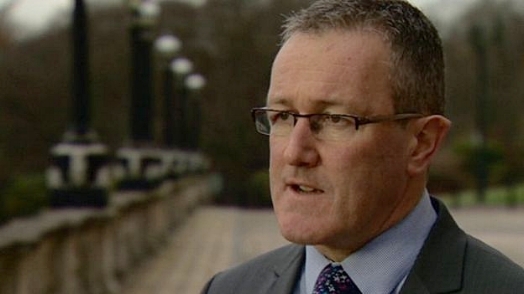This second article on the water charges issue in Northern Ireland comes from a BBC News article 'Water charges: Flushing out the truth' Dec 4, 2014. Good luck with that one. The water charges issue in the Rep. of Ireland mimics it's counterpart in the Six Counties in many ways. One could say we are on a parallel road.
Water charges: Flushing out the truth
Gareth Gordon
BBC NI December 2014
Conor Murphy said he sought change when he was minister
The current minister for regional development has said he is going to stop the practice.
The previous minister for regional development said he wanted to, but the current minister's party, the Ulster Unionists, helped prevent him.
Plenty of others are asking why millions of pounds have been spent since 2007 installing water meters, if the parties agree that we are not going to have water charges?
It is a confusing picture, so let us start at the beginning.
When devolution was restored in 2007, the executive parties put a halt to the process which would have resulted in voters being billed for water, arguing they already paid for it through rates.
But, nevertheless, in accordance with the legislation, meters were still installed at all new properties connected to the public water supply.
A Freedom of Information request by the Irish News newspaper revealed that 35,000 meters have been installed at a cost of £13m. And that cost is rising.
Last week, after the issue was publicised, Regional Development Minister Danny Kennedy revealed he intended bringing forward legislation to end the practice.
Water meters were installed at all new properties connected to the public water supply
But he, and his predecessor, Conor Murphy, clash over why it has never been done before.
Mr Murphy said he tried to, but could not get support from other parties with Mr Kennedy's colleague, Sir Reg Empey, being one of those most strongly opposed to the move.
"It simply wasn't enough to stop what the British government had been trying to do in 2006 and 2007, but we had to change direction for NIW (Northern Ireland Water) in order to put the company itself and the department on a surer footing about where it was going," he said.
"There were a range of papers brought to the executive and Reg Empey and others were the most vociferous opponents.
"If Danny Kennedy is proposing now to change that legislation - to stop the roll out of meters into new builds, because that was legislated for prior to us coming into office and couldn't be changed only with legislation - if he's proposing to do that, then I hope he gets full support from the executive, because I wasn't able to achieve that when I was a minister," he told the BBC's The View.
But Mr Kennedy disputes this version of events.
"My predecessor did nothing that I can trace to have the law amended. I think Sinn Féin (is playing) the politics of both sides off the middle and that's very regrettable indeed.
"There is no significant evidence that supports that. There is clear evidence that something like 26,000 meters were installed during his term as minister for regional development. I'm more interested in changing the law as it stands and I'll be proceeding to do that as quickly as possible."
Councillor Gerry Carroll said two messages were being sent out
Campaigners welcome the move, but are still sceptical.
Gerry Carroll of People Before Profit Alliance said: "It's two messages. On the one hand, we're not going to install water charges and water meters but at the same time having water meters being installed.
"So I think it's coming out and saying to the politicians and the DRD what's happening here?"
Danny Kennedy said the current consensus was that water charges should not be applied
Alliance, which supports water charges, accuses Mr Kennedy of "running scared of populism".
Assembly member Stewart Dickson argues it is prudent to have meters in place when, not if, the charges are introduced.
Northern Ireland Water said it was only complying with legislation, adding the meters are "not being read" and "not being used for charging purposes".
But could they, to use a currently fashionable political phrase, be a Trojan horse?
The BBC asked Mr Kennedy if he ruled out water charges forever and he said he supported executive policy.
But could Ulster Unionist party policy change?
Mr Kennedy said: "Well it's a matter that one single party will not be able to effect this change.
"There has to be consensus around the executive table and it's clear what the consensus is - the consensus is, at present, that water charges should not be applied."




